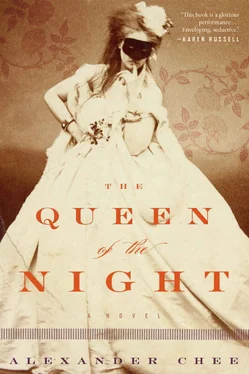It asked the women of Paris to donate their jewels to the effort. A hundred thousand women were to be armed this way.
I was not yet starving; it was easy to be defiant. I imagined going to my Prussian tenor armed this way, his opening the door to me, my face hooded as I reached out. I would stand over him as he fell and died, turning blue from the poison. Prussian blue. I would walk away, free at last, forever.
But, of course, this is not what I did, and he was not the man I would leave for dead.
This also I would not have believed.
On my last night at Nohant, Sand had urged Pauline to sing a favorite song of hers, “Que Quieres, Panchito.” As I watched Pauline sing her song, and Sand looked on, enraptured, the sense of how I would be leaving the next day and what it might mean stole over me.
The grand house and its inhabitants, from these great ladies before me to their lovers and children to their children’s lovers and children, all of it would be gone. I would vanish into whatever strange future the tenor had planned for me.
As I came to the end of my time with these women and their families, I was aware, too, that I had no family of my own; would I ever? I somehow had been spared both marriage and children thus far, mostly as a condition of my class, but not entirely. I had been spared worse, as well — the clap, tuberculosis, smallpox, wasting — and till now, I had given it little thought. Your health, when you have it, is invisible to you. I only thought of myself as lucky and that this was my only luck. But was I lucky? Or did I have a spiteful womb, as Euphrosyne had once said of her own? Or was it the horseback riding, as Odile had once suggested playfully, or something else altogether? At the Majeurs-Plaisirs, I had taken the teas Odile supplied, cleaned myself as directed; I had gone to my required doctor’s visits, and none of the familiar misfortunes associated with my former livelihood had come to pass, as near a miracle in my life as anything.
But I had since left the circle of Odile’s protections. The tenor’s attentions to me, however, had continued, though his carnal interest in me had been transformed by affection. He no longer sought to relieve himself in me as before, but now acted as a man in love — husbandly, even at times like a fiancé. But he and I could never marry, I knew; our time in Baden-Baden had meant being surrounded by his aristocratic peers, and while these German royals deigned to attend Pauline’s salon, I knew well the invisible line around me that would keep me from ever being the tenor’s bride, and I was grateful, in a way, for that.
I was concerned, though, with another line, visible in the light of the candles illuminating these happy families. My luck seemed to me something else: a decree from that hidden god, or my mother’s God, or perhaps Fortune, whom Pauline often invoked — a sign that I was to remain in this world until my lesson, such as it was, had ended, and only then would I join my family in death, at which time we would pass from the world forever. No family and no children for me. I was to be the last of my line, I was sure of it.
The tenor appeared in a hired carriage the next morning, seeming much as he had the last time we saw him; there was no visible sign of his transformation. He was handsome, witty, charming Pauline with his jokes as he always did, and Sand as well. Pauline did not let on in the least that she was angry or disappointed or afraid, projecting only that same benign queenly power. And just as she did not complain, he did not perform an apology nor did he explain his reasons for changing our plans. Sand invited him to stay for lunch but he begged off; urgent business, he said, and this was the single moment when a faint pall appeared. What business could there be?
After the carriage had been packed and I had kissed all of them, Pegasus appeared then to push his snout into my hand one last time.
Your true love, Turgenev said. I cannot think of when this dog has ever said good-bye to anyone.
May Fortune protect us all, Pauline said, and the door to the carriage shut behind me.
As we traveled back, I believed the tenor was bringing me to Paris to die with him. Some final act of spite in the face of the war. Having failed to arrange for us to perform together in a tragedy onstage, he would make a tragedy out of our lives.
There was no other way for me to understand why a Prussian tenor would return to Paris if there was to be war between France and Prussia. Why would he not return home? Would he not be captured or expelled, kept from crossing the border? We would be going deeper into the war on the enemy side, not away from it.
The answer to my own question was visible in these questions. I simply wasn’t prepared to understand it.
§
The tenor had reassured me repeatedly on the train back from Nohant that Paris would be the safer during the war — it was so widely loved, the idea it would be destroyed was madness; after all, who could shell the Louvre? And this was what people said in the streets on my return.
My calm lasted until the drive back from the station in our carriage, when we passed the Conservatoire National des Arts et Métiers, which seemed already set to the task of manufacturing cannons. From the street, the machines inside sounded like thunder.
Whether or not the Louvre was shelled, it seemed it might be transformed so as to shell the Germans itself.
All of Paris was to become a weapon; we were not so much at war as in the belly of a machine that was going to war. There were regular predictions in the newspapers of methods for the waging of war with Germany: guns mounted on balloons and fired from the sky; poisoning the Seine against invaders; setting loose the animals at the zoo if Paris was occupied. None of this was done. Instead, late into the Siege to come, when the zoo animals were finally remembered, they were not set loose but instead butchered and eaten.
Most never found money enough to try the blood pudding made from the elephant’s heart, though. For them, there was the bark on the trees, which cost nothing, and would soon all be stripped bare by the hungry from the ground to just above shoulder height.
Given the transformation at work around us, it would have seemed to be a foregone conclusion that we also would be changed; and yet, for longer than I might have believed, we carried on as if nothing about us could be changed.
§
I found the avenue de l’Opéra apartment mostly as it had been, as if it were aloof to my absence, though all had been prepared for my return. Fresh flowers sat in vases, the shrouds had been taken off the furniture, the rooms aired out, the floors swept and dusted. Lucy and Doro appeared from behind the kitchen door as if I had only just gone out earlier that day. Their faces were expectant, and I shouted and hugged both of them, to their embarrassment and evident pleasure. The tenor deposited me with my trunks and left to settle himself as well.
I sat down at the piano in the music room, intent on doing my exercises, to find it out of tune. Unable to practice, as was now my habit, I was reminded again of how the tenor had been unequal to the task of guiding my voice before. This had been a courtesan’s piano, not that of a soprano. I was once again alone with the unsteady hands of his obsession.
Yes, at Baden-Baden, I had been inside it also — but there he had made up for abuses like this. We had returned to those old ways in some way, I feared, as well as to Paris, and I could not foresee a happy end.
I dressed to go out and take a walk. I dressed simply, still in the style of the Baden-Baden camp, as if the clothes might keep me there at least in spirit. I added a parasol, hat, and gloves, for it was now summer. As I stood there, about to exit, the doorbell rang. I was nearest to it and opened the door to find the tenor there.
Читать дальше












